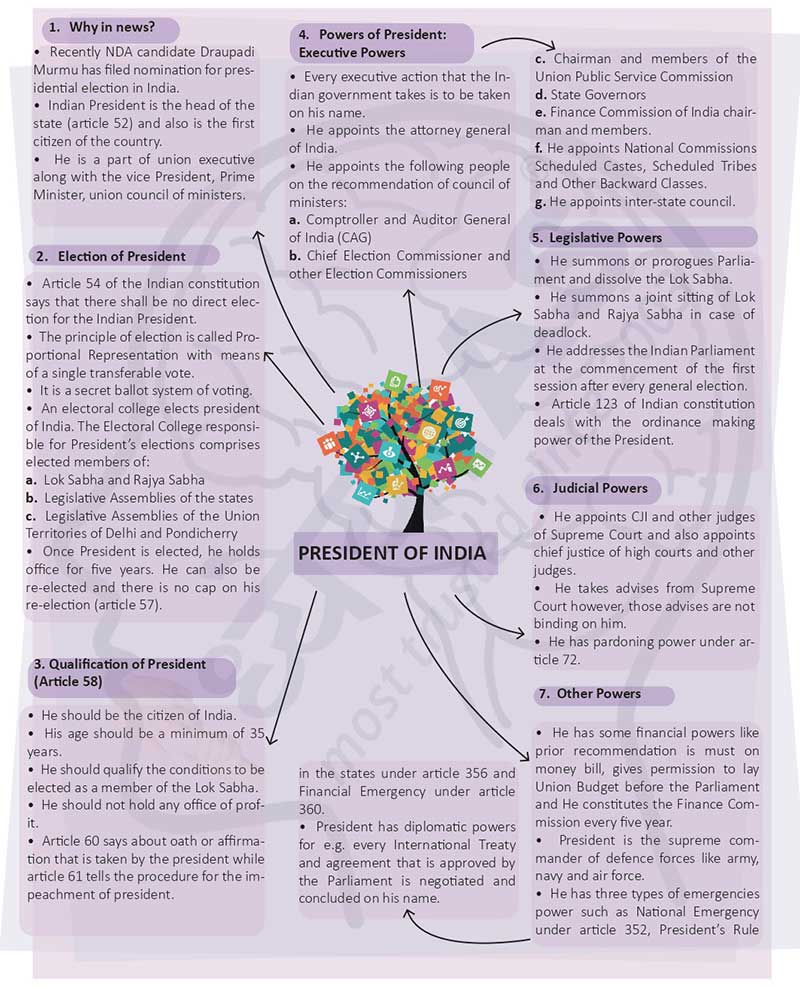Brain-booster /
20 Jul 2022
Brain Booster for UPSC & State PCS Examination (Topic: President of India)

Why in news?
- Recently NDA candidate Draupadi Murmu has filed nomination for
presidential election in India.
- Indian President is the head of the state (article 52) and also is the
first citizen of the country.
- He is a part of union executive along with the vice President, Prime
Minister, union council of ministers.
Election of President
- Article 54 of the Indian constitution says that there shall be no direct
election for the Indian President.
- The principle of election is called Proportional Representation with
means of a single transferable vote.
- It is a secret ballot system of voting.
- An electoral college elects president of India. The Electoral College
responsible for President’s elections comprises elected members of:
- Lok Sabha and Rajya Sabha
- Legislative Assemblies of the states
- Legislative Assemblies of the Union Territories of Delhi and
Pondicherry
- Once President is elected, he holds office for five years. He can also
be re-elected and there is no cap on his re-election (article 57).
Qualification of President (Article 58)
- He should be the citizen of India.
- His age should be a minimum of 35 years.
- He should qualify the conditions to be elected as a member of the Lok
Sabha.
- He should not hold any office of profit.
- Article 60 says about oath or affirmation that is taken by the president
while article 61 tells the procedure for the impeachment of president.
Powers of President: Executive Powers
- Every executive action that the Indian government takes is to be taken
on his name.
- He appoints the attorney general of India.
- He appoints the following people on the recommendation of council of
ministers:
- Comptroller and Auditor General of India (CAG)
- Chief Election Commissioner and other Election Commissioners
- Chairman and members of the Union Public Service Commission
- State Governors
- Finance Commission of India chairman and members.
- He appoints National Commissions Scheduled Castes, Scheduled Tribes
and Other Backward Classes.
- He appoints inter-state council.
Legislative Powers
- He summons or prorogues Parliament and dissolve the Lok Sabha.
- He summons a joint sitting of Lok Sabha and Rajya Sabha in case of
deadlock.
- He addresses the Indian Parliament at the commencement of the first
session after every general election.
- Article 123 of Indian constitution deals with the ordinance making power
of eth President.
Judicial Powers
- He appoints CJI and other judges of Supreme Court and also appoints
chief justice of high courts and other judges.
- He takes advises from Supreme Court however, those advises are not
binding on him.
- He has pardoning power under article 72.
Other Powers
- He has some financial powers like prior recommendation is must on money
bill, gives permission to lay Union Budget before the Parliament and He
constitutes the Finance Commission every five year.
- President is the supreme commander of defence forces like army, navy and
air force.
- He has three types of emergencies power such as National Emergency under
article 352, President’s Rule in the states under article 356 and Financial
Emergency under article 360.
- President has diplomatic powers for e.g. every International Treaty and
agreement that is approved by the Parliament is negotiated and concluded on
his name.








